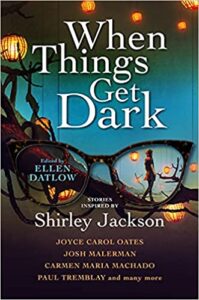When Things Get Dark: Stories Inspired by Shirley Jackson edited by Ellen Datlow
Titan Books, 2021
ISBN-13 : 978-1789097153
Available: Hardcover, Kindle edition, audiobook ( Bookshop.org | Amazon.com )
Shirley Jackson couldn’t have known the impact her writing would have on the horror genre, speculative fiction, and literature in general: she was writing to pay the bills. Yet her work has resonated with readers and writers for both its depictions of domesticity, such as her fictionalized memoir, Life Among the Savages, and of the uncanny, seen in short stories like “The Lottery” and her most famous novels, The Haunting of Hill House and We Have Always Lived in the Castle (and sometimes both together). In When Things Get Dark, well-known anthology editor Ellen Datlow has collected tales by talented writers of horror, the uncanny, and the weird, inspired by Shirley Jackson’s work.
A number of stories take place within suburbia, with the uncanny just beneath a placid surface. Laird Barron’s “Tiptoe” focuses on uneasy family dynamics and the necessity of keeping up appearances, and “For Sale By Owner” by Elizabeth Hand, is a meandering story about three elderly women with a habit of breaking into empty summer houses who hold a sleepover in an empty, beautiful old house, which turns out to be a disorienting and disturbing experience. In Richard Kadrey’s “A Trip to Paris”, a nod to We Have Always Lived in the Castle, a recent widow planning her escape from her mundane life has her nefarious actions revealed by a stubborn, growing patch of mold on her wall, while Jeffrey Ford’s “The Door in the Fence” documents the strange and surprising changes in the narrator’s next door neighbor after her husband dies.
Some stories take direct inspiration from Jackson’s work, such as Carmen Maria Machado’s “A Hundred Miles and a Mile”, which references the “cup of stars” from The Haunting of Hill House, and stories such as “Quiet Dead Things” by Cassandra Khaw and “Hag” by Benjamin Percy that describe insular communities and their deadly rituals like the one in “The Lottery”.
With others, it’s sometimes hard to see the connection, although the stories are interesting. In Seanan McGuire’s dark fairytale “In the Deep Woods; The Light is Different There”, a woman escaping an abusive husband retreats to her family’s lake house, where she discovers the caretakers are not what they seem. John Langan produces a compelling, surreal tale of family, the occult, and mythological creatures in “Something Like Living Creatures”. In the dread-inducing “Money of the Dead”, Karen Heuler addresses the problems with resurrection and obsessive love; Joyce Carol Oates’ “Take Me, I Am Free” is a bleak, heartbreaking story about a child whose angry mother attempts to throw her away; in Josh Malerman’s dystopian “Special Meal”, a young girl discovers the difficulties, and consequences, of hiding knowledge. Genevieve Valentine’s “Sooner or Later, Your Wife Will Drive Home” is a cleverly constructed story about smart women in unlucky situations they can’t escape, something Jackson could certainly relate to. There were a few stories that didn’t hit the mark: “Funeral Birds” petered out at the end, “Refinery Road” and “The Party” left me confused, and “Pear of Anguish” didn’t seem to fit the theme or mood of the anthology.
While there are many excellent stories, the three that stood out to me were the previously mentioned “Tiptoe”; “Take Me, I Am Free”, a bleak, heartbreaking story about a child whose angry mother attempts to give her away; and Kelly Link’s “Skinder’s Veil”, a strange tale about a graduate student struggling with writing his dissertation who takes a housesitting job in rural Vermont, with the only rules being that anyone knocking at the back door must be invited in, but the front door should never be opened. Those who come to the back door are an unusual bunch, and the consequences of that summer are significant for him.
It’s not necessary to be a fan of Shirley Jackson to enjoy this book, but it does help, especially with Machado’s story, which depends on context from The Haunting of Hill House. If you do pick up When Things Get Dark without having read Jackson first, you will want to by the time you finish. Recommended.
Contains: self-harm, torture, suicide, murder
Reviewed by Kirsten Kowalewski





Follow Us!